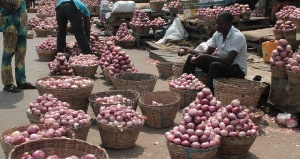As prices of onion continue to rise, the commodity’s sellers are in fear of losing their livelihoods due to low patronage.
The country currently imports about 70 percent of its onions mainly from Niger, a major dry onion supplier in West Africa, despite having suitable land for its cultivation.
But as prices keep rising as a result of a weaker cedi and instability in the Sahel Region, contributing to higher cost of importation of onions, traders at Agbogbloshie and other major markets in Accra say the situation is posing a real threat to their livelihoods.
For instance, the price of a bigger bag – 100kg – of the bulb-shaped onion soared by 78 percent from GH¢900 in Q3 2023 to GH¢1,600 in January 2024.
Also, the price of a smaller bag – 25kg – has gone up by 100 percent from GH¢300 in Q3 of last year to GH¢600 in January 2024, with smaller quantities of onions in measuring cans, popularly known as ‘olonka’, surging from GH¢15 in Q3 2023 to GH¢60 in January 2024 – representing an increase of 300 percent.
Sufyan Ibrahim, an onion trader at the Agbogbloshie Millennium Market in Accra, speaking on behalf of the commodity’s chief trader at Agbogbloshie, cited the depreciation of the cedi against major trading currencies, including the CFA, and persistent highway robbery attacks on transporters as some of the factors occasioning the price surge.
He lamented that onions are increasingly becoming a luxury for most shoppers due to the rising prices amid the current harsh economic conditions.
“Due to frequent attacks, truck drivers are afraid to travel the routes to and from Niger. They complain that the Police are unable to protect them from highway robbers who do not only take their money, but sometimes kill them. They also tell me that the road to Niger is among the most dangerous within ECOWAS,” he added.
He explained that the current instability in the Sahel, which has persisted for about a year now, is the reason there has not been an onion glut in Ghana in a long while.
While expressing worry about dwindling customer patronage due to the high cost of onions, he called on the government to put in place measures to stabilise the cedi. He also charged regional and international leaders to speed up efforts to restore peace to the Sahel.
More importantly, Mr. Ibrahim implored the government and private investors to promote domestic onion production, highlighting the benefits of doing so to the economy.
Sleeping on opportunities
Plant biologist and lecturer at the West Africa Centre for Crop Improvement (WACCI), University of Ghana, Dr. Agyemang Danquah, in an interview with the B&FT, stressed the need for government to take onion production seriously.
By promoting investment in domestic production, he said the government could kill two birds with one stone – reduce the import burden on the cedi and at the same time create sustainable jobs. He added that there is a ready market for onions and any investment in local production would yield returns.
While urging farmers to adopt smarter methods of cultivation, he appealed to government to provide assistance to enable farmers to produce all-year-round to maintain price stability.
“It is high time we shifted from traditional ways of onion cultivation to adopting modern ones, such as the greenhouse system, to maximise production for local consumption and export,” he added.
He further implored government to facilitate access to research funds to enable the country’s crop research institutions to produce breeder and foundation seeds for the vegetable while also coming out with other suitable varieties to boost local production.
This, when done, the plant biologist reiterated, will enable the country to beat competition from Niger, Nigeria and other places where it is sourced.
In West Africa, onions are highly valued and often used in the cuisines of various people, especially Ghanaians. Many meals include onions as a garnish, whether they are boiled, fried, caramelised or even served raw. According to experts, it improves blood sugar management and boosts bone density, among other health benefits.
Business News of Wednesday, 24 January 2024
Source: thebftonline.com













